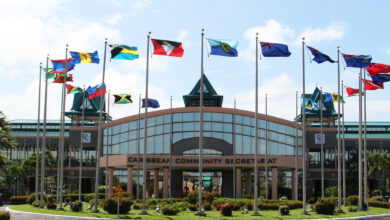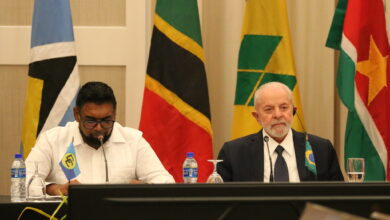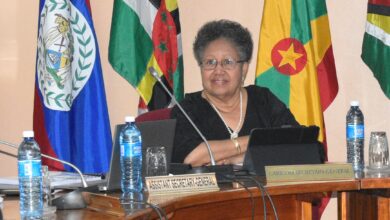The Council for Trade and Economic Development of the Caribbean Community (CARICOM) concluded a two-day meeting on 7 November 2014.
Key agenda items were strengthening the operation and effectiveness of the CARICOM Single Market and Economy (CSME) and the free movement and the facilitation of travel; engagement with the private sector; external economic and trade relations; and the strategic direction for growth and development of the Region.
Discussions on free movement and the facilitation of travel were conducted against the background of an acknowledgement that the majority of persons move hassle-free throughout the Region. There was an entreaty by Ambassador Irwin LaRocque, Secretary-General of CARICOM, for adherence to Regional decisions, since apathy to the implementation of those decisions was having a debilitating effect on the Community.
Free Movement of Skilled CARICOM nationals is one of the key regimes of the CSME which the Secretary-General pointed out remained the best platform for the economic growth and human development of the Region.
To the average person on the street, the Secretary-General noted in his remarks at the opening ceremony, the success of CARICOM was measured by his or her ability to move freely around the Region, in accordance with Community decisions which form part of our body of Community law. “Our less than complete success in turning the concept of free movement, as agreed, into real personal experience has undermined our credibility as a Community,” he said.
Following extensive and frank discussions, the Ministers determined that Member States needed to educate their populace on free movement. In addition, the Ministers called for the continuation of training and sensitization exercises for border and immigration officials. They decided that the Council, in collaboration with the Legal Affairs Committee, must undertake an analysis of the work that was done so far on the implementation of the CCJ ruling on the Shanique Myrie case and the challenges being encountered in this regard. The CARICOM Secretariat was also asked to provide periodic assessments of the Free Movement Regime to the COTED.
The extensive discussions on the Private Sector were based primarily on a submission on `The Role of the Private Sector in Regional Economic Development: A Proposal for Improving Harmony and Cooperation’ made by Consultant, Mr. James Moss-Solomon. The study was commissioned by the Caribbean Export Development Agency (Caribbean Export) on behalf of the CARICOM Secretariat.
The Ministers determined that the development of the Caribbean Business Council (CBC) was of paramount importance and support should be provided so that the Council could commence on a firm footing. However, pending the CBC becoming operational, the Caribbean Association of Industry and Commerce (CAIC) will be invited to be the private sector’s representative at the Meetings of the Council.
The Ministers agreed on a way forward with respect to a proposal to conclude negotiations on a CARICOM-Canada Trade and Development Agreement. The Secretary-General had indicated that in an effort to move the process forward, a package of proposals had been developed under his direction for consideration by the Heads of Government. These proposals were submitted to the COTED.
There were fruitful discussions on the strategic direction for growth and development. Ministers focused especially on the Council’s role in achieving sustainable economic development through human capital development to ensure the availability of the necessary skills; ICT, particularly in the context of the Single ICT Space; and energy efficiency. The discussions took into account the work of the Commission on the Economy, and the Regional Transportation Commission. The two Commissions were established in 2013. The mandate of the Commission on the Economy is to advise on priority areas of fiscal sustainability, resource mobilisation and employment; critical economic infrastructure services, specifically energy and ICT; and debt relief and restructuring. The Regional Transportation Commission covers both air and maritime transport, with emphasis on the delivery of adequate, fair, competitive, efficient transportation services at affordable costs; the paramount need for safety and security of the transportation infrastructure; cost and sustainability of transportation in the Region; ease of travel; maintenance of essential air and maritime links with external partners; and strengthening the economic development of CARICOM and Member States and their economic integration through trade and the movement of people and freight.







